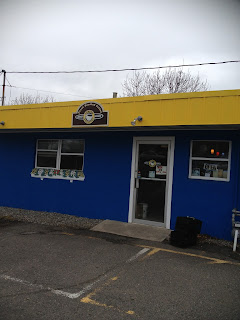I did some research and found a local coffee roaster here in NJ. We took a trip to Leonardo NJ to visit jerseyshorecoffeeroasters. We pull up to this trippy painted building that looks like it used to be an old pizzeria.
I meet one of the owners and we get a tour. There is a small roasting machine and buckets of roasted coffee beans on the floor. It smelled glorious. We tried several different kinds of coffee and espresso and picked out some winners. They will make a custom blend for us so I am planning to tweak one of there existing blends to make it our own. I feel by getting freshly roasted coffee with a great blend we will set ourselves apart and not be like" that guy" down the street. And did I mention we will only be doing decaf, regular, espresso and cappuccino so if you want your caramel pumpkin macchiatto with soy milk froth get on the train and buy a one way ticket to screw you town ( I'm sure there is a starbucks or Funkin doughnuts there}
With the coffee sourced now I search for the perfect brewing machines to do"our" blend justice
Specialty coffees represent 37% of US coffee cups and are considered the highest quality in the world.
The retail value of the U.S. coffee market is estimated at
$30-32 billion dollars, with specialty comprising
approximately a 37% volume share but nearly 50% value
share.
40% of 18-24 year olds said they drink coffee daily, up from
31% in 2010 and on par with 2009’s 40%, while 54% of 25-
39 year olds said they drink coffee daily, up from 44% in
2010 and on par with 2009’s 53%.**
58% of consumers aged 18+ drank coffee yesterday, compared with 56% in 2010, 59% in 2009, and 60% in 2008.**
There are two primary types of coffee, Arabica and Robusta, and the vast majority of coffee used in the specialty industry is of the Arabica type.
The absence of defects is critical and in practice, according to SCAA protocols, a single coffee is cupped at least fifteen (15) times by professional cuppers trained to identify flaws, ensuring there is no bitterness, harshness, sourness, or other off-putting flavors or aromas. A skilled cupper should be able to detect these defects in the cup.
Thirty-six (36) aromatic profiles have been
identified and can be attributed, both
positively and negatively, to the flavor of a
coffee.
Much like wine, coffee flavor is affected by soil, altitude and other climatic factors and in Ethiopia alone there are reportedly over 10,000 varietals.
2


